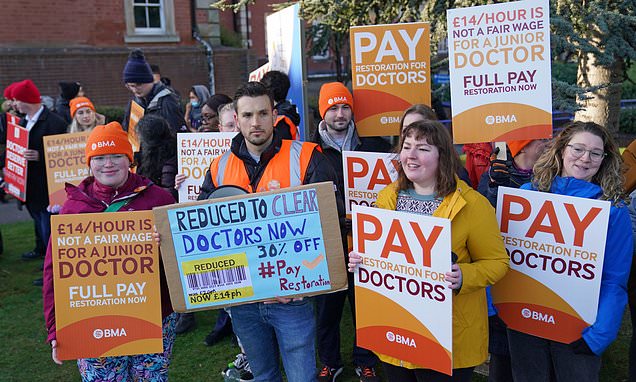Hospital consultants will strike for two days in September in pursuit of a 54 per cent pay rise as industrial action runs into its third month
- Read more: Consultant doctors launch 48-hour strike set to cause disruption
Hospital consultants pursuing a 54 per cent pay rise will strike for two days in September as they extend industrial action into a third month.
The British Medical Association said senior doctors will walk out on September 19 and 20 if the Government ‘refuses to agree to pay talks’ and fails to make a ‘credible’ new offer.
Prime Minister Rishi Sunak awarded consultants a 6 per cent rise last month, taking their average NHS income to £134,000 a year.
But the union described the sum as ‘insulting’ and ‘derisory’.
Consultants staged a two day walkout on July 20 and 21 and have already announced plans to picket again on August 24 and 25.

Striking NHS junior doctors on the picket line outside Leicester Royal Infirmary

The British Medical Association said senior doctors will walk out on September 19 and 20 if the Government ‘refuses to agree to pay talks’ [File image]
The BMA said it has written to health secretary Steve Barclay to invite him to discuss pay and reform of the doctors’ pay review body.
However, Mr Sunak has indicated there will be no more negotiations, insisting the 6 per cent figure is ‘final’.
Industrial action by the likes of doctors, nurses, physiotherapists and radiographers has so far led to the cancellation of more than 835,000 appointments and operations and seen NHS waiting lists rocket to a record 7.5 million.
READ MORE: Junior doctors across England stage ‘longest strike in NHS history’
Dr Vishal Sharma, chairman of the BMA’s consultants committee, said: ‘It is now 133 days since the Secretary of State last met with us, demonstrating the Government’s complete disregard for the expertise and value of consultants, and the very future of the health service and its patients.
‘We are once again appealing to the Health Secretary to return to the table and discuss both pay and reform of the rigged pay review process, so that we can reach a point where strikes are not necessary.
‘Consultants will go out on strike at the end of this month, and for a further two days in September – demonstrating our resolve and clearly signalling to government that we’re in this for the long haul.
‘However, neither of these strikes need to take place at all if the Government drops its intransigent position.’ The BMA said the September dates have been announced in advance to ensure that hospitals have enough time to prepare and prioritise patients who need care the most.
The walkouts will consist of ‘Christmas Day’ cover, meaning the doctors will provide emergency care only.
The BMA claims consultants’ pay has fallen by around 35 per cent since 2008 and it is seeking ‘full restoration’, which would require a pay rise of 54 per cent.

Co-chairs of the BMA’s junior doctors’ committee Vivek Trivedi (left) and Rob Laurenson speak to the media outside the Department Of Health And Social Care
Junior doctors are staging a separate four-day strike from 7am on Friday, but their action is more hardline than their senior colleagues as they will even refuse to deliver emergency care.
Miriam Deakin, director of policy and strategy at NHS Providers, said: ‘This new round of strike action in September – just weeks after walkouts by junior doctors and consultants in August – will pile the pressure on the NHS and lead to more disruption for patients and trusts.
‘Over 835,000 operations and appointments have been delayed since December due to nine months of back-to-back industrial action.
‘But the knock-on disruption will be felt for months to come with many more patients not being booked in for appointments during strike days and others having their appointments rescheduled.
‘Each wave of strikes sets back efforts to cut record high waiting lists, delays care for patients, and leads to mounting costs for trusts.
‘Trust leaders understand the strength of feeling among striking staff. We need the Government and unions to find a solution fast, and ideally before the really challenging winter months.’
Source: Read Full Article

